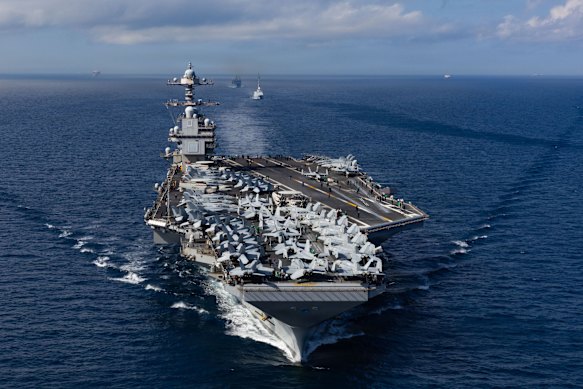
The USS Gerald R. Ford, the world’s largest aircraft carrier, arrived in the Caribbean Sea on Sunday, marking a significant display of US military power. This move raises questions regarding the intentions of the Trump administration as it increases military presence in South America, particularly in relation to ongoing operations against vessels suspected of drug trafficking.
The deployment of the USS Gerald R. Ford, along with additional warships, was confirmed by the US Navy in a statement. While the administration characterizes this as part of a counter-drug operation, critics view it as an escalated pressure tactic directed at Venezuelan President Nicolás Maduro. The arrival of the carrier coincides with heightened military activities in the region, with the US conducting strikes against small boats accused of transporting drugs.
Military Options Under Consideration
During a press briefing aboard Air Force One on Saturday, Donald Trump indicated that he is contemplating military action in Venezuela, stating he has “sort of made up [his] mind.” According to a report from the London Telegraph, various military options have been presented to him, including the deployment of special operations forces and direct intervention inside Venezuela.
Since early September, US military strikes have reportedly resulted in the deaths of at least 80 individuals across 20 attacks targeting small vessels in the Caribbean and eastern Pacific Ocean. This surge in military activity represents the largest build-up of US firepower in the region in generations, with the USS Gerald R. Ford leading the charge.
Operation Southern Spear and Its Implications
The operation, dubbed Operation Southern Spear, includes nearly a dozen ships and approximately 12,000 sailors and Marines. The carrier strike group, which encompasses squadrons of fighter jets and guided-missile destroyers, transited the Anegada Passage near the British Virgin Islands on Sunday morning, as reported by the Navy.
Rear Admiral Paul Lanzilotta, commander of the strike group, emphasized that the operation aims to “protect our nation’s security and prosperity against narco-terrorism in the Western Hemisphere.” This assertion underscores the administration’s narrative that the military presence is primarily focused on combating drug trafficking, despite broader geopolitical implications.
As tensions mount in the region, the deployment of the USS Gerald R. Ford serves as a multifaceted statement of US military readiness and a potential signal of intentions toward Venezuela. The international community will be closely monitoring these developments as they unfold.







